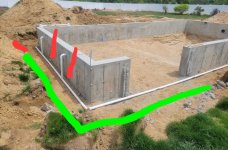- Aug 19, 2018
- 254
- Pool Size
- 23000
- Surface
- Vinyl
- Chlorine
- Salt Water Generator
- SWG Type
- CircuPool RJ-45
So - Minnesota. For the last 25 years I've closed the pool using my trusty air compressor into the pump pot to blow out all the lines. It has pressure, but not a lot of volume. Usually run it pretty high (80 psi) at the compressor, figuring as it expands when hitting the pipes the pressure drops significantly. I usually have to redo each skimmer/outlet two to four times before it stops burping any water. Since there is doubt, I've always used a screw in elbow and length of pipe to funnel in a couple gallons of -70 antifreeze into each line, except the main drain.
Because of filter/plumbing changes, using the compressor gets a more complicated this year. So the Cyclone blower is coming. Yea! Volume of air, without high pressure.
Don't know what the pool companies do, and the lawn sprinkler guys definitely don't do antifreeze
Yes, we can have periods of a week at -20 or -30F at night, and from about Xmas to March are pretty much always below, or well below, 32. Frost line can be from 3 to 4 feet. So if something can break from trapped freezing water, it will.
So - keep on adding the antifreeze, or will using the Cyclone do a better job of getting out the water, and I can skip that step?
Because of filter/plumbing changes, using the compressor gets a more complicated this year. So the Cyclone blower is coming. Yea! Volume of air, without high pressure.
Don't know what the pool companies do, and the lawn sprinkler guys definitely don't do antifreeze
Yes, we can have periods of a week at -20 or -30F at night, and from about Xmas to March are pretty much always below, or well below, 32. Frost line can be from 3 to 4 feet. So if something can break from trapped freezing water, it will.
So - keep on adding the antifreeze, or will using the Cyclone do a better job of getting out the water, and I can skip that step?


